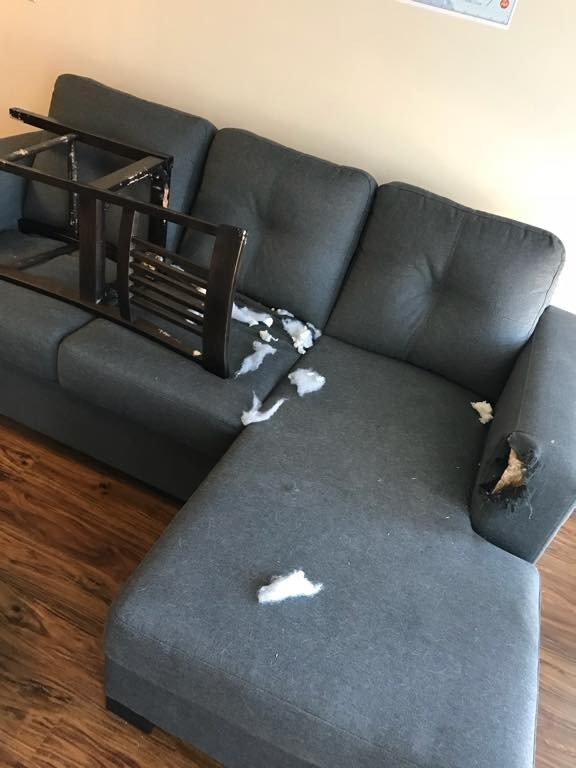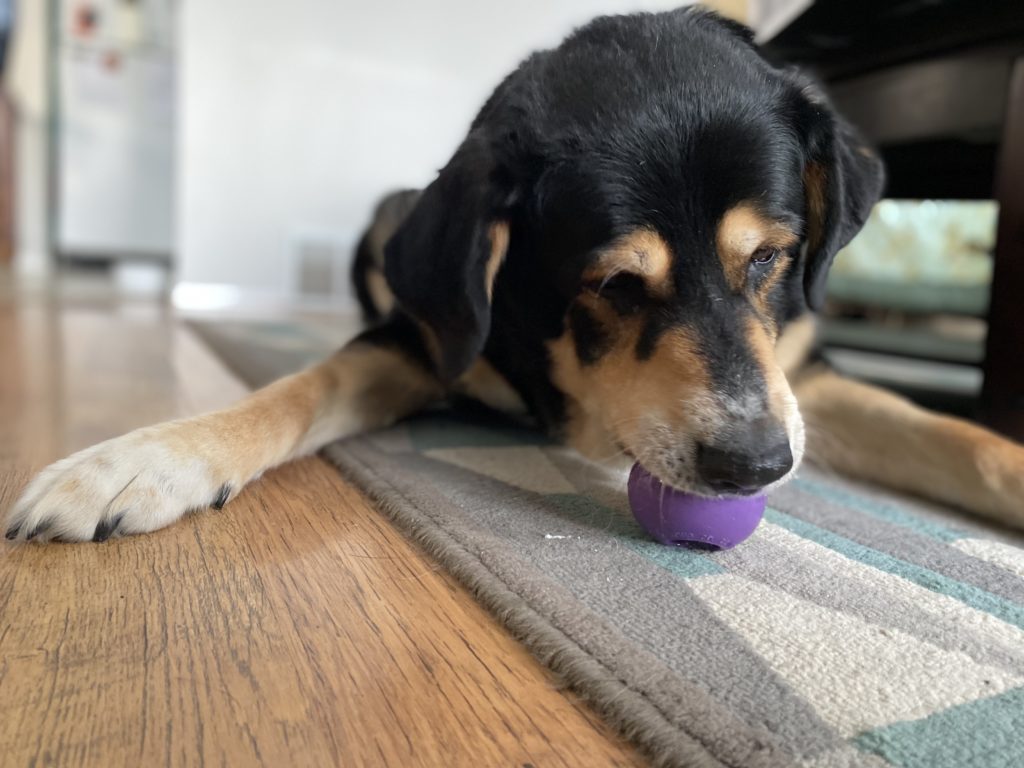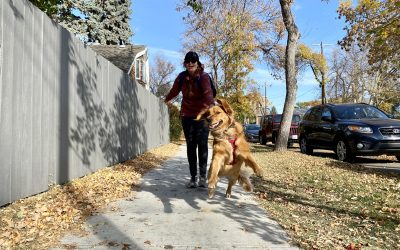Does your dog seem to get excited or anxious every time you’re getting ready to leave for the day? Ever notice your dog barking, howling, or whining after you leave your house? Have you ever come home to a pillow explosion, a new hole in your drywall, or what looks like a tornado ripped through? If you can relate to any of these, there’s a chance your dog suffers from separation anxiety.
What is Separation Anxiety?
Separation Anxiety is an anxiety disorder where a dog experiences excessive anxiety when their owner(s) leave them alone. It can vary in degrees of severity and can be super stressful for all family members. With many Edmontonians being home much more often due to COVID 19, we often forget about how that may impact our pets as pet parents head back to work. There is a possibility that pets will get used to that extra love and attention, which then may cause them to become anxious once their parents head back to work and no longer have the extra attention. Like people, every pet is different and handles things differently. Some pets can become destructive, vocal, or even aggressive. It’s important to know that pets do not intentionally exhibit these unwanted behaviours, but are more of their way of dealing with their anxiety.
What are some signs of Separation Anxiety?
More often than not, many signs of separation anxiety are often unwanted behaviours. Signs can include:
- Destructive behaviour – scratching at windows/doors, digging, chewing things like baseboards, furniture, shoes, etc.
- Vocalization – excessive barking, howling or whining
- Bathroom ‘Accidents’ when they are house trained
- Trying to escape
- Excessively panting, drooling, or pacing
 Experiences like being left alone for the first time, moving homes, having changes to routine, or loss of a family member can often trigger episodes of separation anxiety. Luckily there are many things that owners can do to help their pups and reduce stress.
Experiences like being left alone for the first time, moving homes, having changes to routine, or loss of a family member can often trigger episodes of separation anxiety. Luckily there are many things that owners can do to help their pups and reduce stress.
How can you help?
There are several things pet parents can do to help ease their pets’ anxiety, but it depends on the severity. We would first recommend seeing your pet’s veterinarian when you first notice a change in behaviour to rule out any medical issues.
If your pet is suffering from mild anxiety, there are a few simple things you can do.
- Do not make you leaving the house or coming home a big thing. Ignore them when you are leaving the house and for a few minutes after you come home. (We know how tough that is!)
- Give your dog a treat like a frozen Kong or their favourite chew when you leave.
- Leave your pet with clothes or blankets that smell like you.
There are also some natural calming supplements available. If you are unsure about what to use, we recommend chatting with your veterinarian.
If your pet is experiencing pretty severe separation anxiety, here are some things you can do to help but will require some work.
- Desensitization – This is especially helpful if you notice certain actions trigger anxiety in your dog. Anytime you put your shoes on, reach for your coat or grab your keys, your pup associates those actions with you leaving. What you can do is carry out those motions, but instead of leaving the house after, stay home. The goal is to break the association between those actions and you leaving the house.
- Once your dog is less nervous when you put your shoes on, reach for your coat or grab your keys, you can work on leaving your pet. The key is to do this slowly and not rush. A good starting point is trying to separate yourself from your pet with a bedroom door with the eventual goal of leaving the house. Ask your dog to stay while you go to the other room, close the door, and reappear after a few seconds. When your pup is more calm and relaxed with you leaving, slowly increase the length of time that you are gone.

If you haven’t already, we would recommend that you slowly change your dog’s routine to reflect your ‘pre-COVID’ schedule. Especially if your current schedule largely differs from how it looked before- sleeping in, someone always being home, cuddles at any time of the day. Practicing your ‘pre-COVID’ schedule will give your dog a chance to adjust to your routine before you head back to work. With Alberta’s relaunch strategy in motion, many Edmontonians will be returning to work over the next several weeks.
Generally speaking, all furbabies benefit from adequate exercise and mental stimulation. Regular exercise with your dog is a great way to get the whole family involved and active, plus there are so many great dog walking trails in Edmonton. Some mentally enriching activities to try out include practicing tricks, obedience, and playing games with your dog. We truly believe that a tired dog is a happy dog! A tired pup will also be less anxious when you’re gone, which will lower the chance your dog exhibiting some of those less desirable behaviours we mentioned earlier.
Need help burning off that puppy energy while you’re trying to focus on work?
Let us help you find peace of mind knowing your dog is cared for when you are at work or working from home!
Book your virtual consult today!





